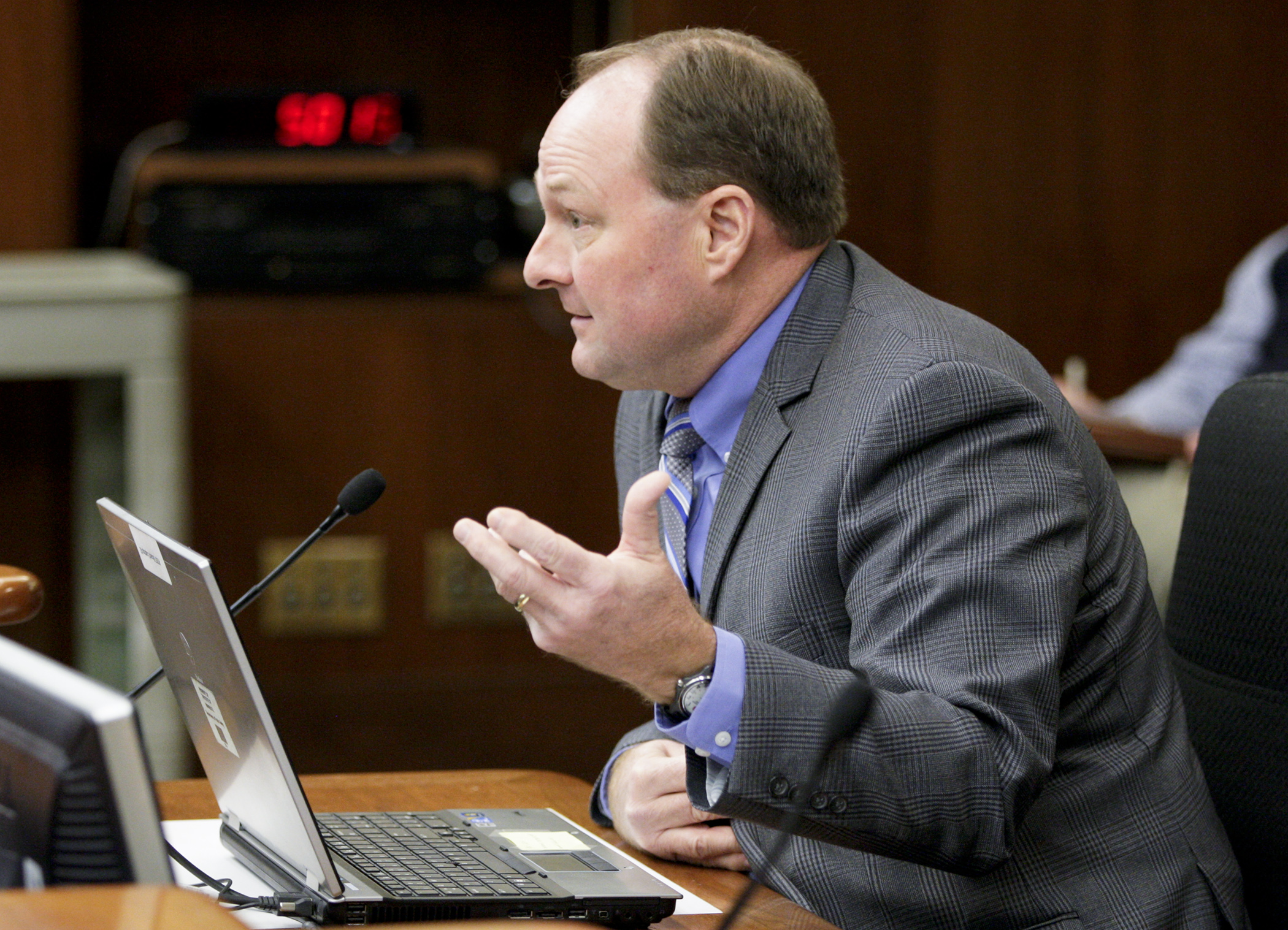Officer training requirements, funding concerns shared with House panel
Minnesota has 10,722 active, licensed peace officers across 437 law enforcement agencies that range in size from larger departments in the Twin Cities metropolitan area to the 19 agencies with a lone officer.
No matter the department’s size — geographically or in number of bodies — all officers must go through annual training. However, associated cost concerns continue to grow.
That was among the messages provided to the House Public Safety and Security Policy and Finance Committee Thursday. No action was taken; however, proposed legislation is expected soon.
“Minnesota has some of the highest-trained and educated officers,” said Nate Gove, executive director of the Board of Police Officer Standards and Training, commonly referred to as the POST Board.
 Nate Gove, executive director of the Minnesota Peace Officer Standards and Training Board, provides a board update Jan. 19 to the House Public Safety and Security Policy and Finance Committee. Photo by Paul Battaglia
Nate Gove, executive director of the Minnesota Peace Officer Standards and Training Board, provides a board update Jan. 19 to the House Public Safety and Security Policy and Finance Committee. Photo by Paul BattagliaAccording the board’s website: “Every active and inactive peace officer and active part-time peace officer must complete a minimum of forty-eight hours of continuing education within the three-year licensing period in order to maintain and renew their license. Active officers are mandated to train annually in use of force and once every five years in emergency vehicle operations/pursuit driving. Inactive peace officers are not required to complete mandated training, however are required to have forty-eight hours of law enforcement related continuing education training.”
To get the mandated training, officers and/or the jurisdiction they serve often have to pay more than what is reimbursed by the state.
Gove said law enforcement agencies reported spending more than $34 million in training last year. State reimbursement was just over $2.8 million.
“For some smaller agencies that dollar amount plays a much more significant role in their budget,” he said. “For some agencies, it’s their entire budget.”
Funds for training reimbursement have decreased from $477 per officer in Fiscal Year 1989 to $312 in Fiscal Year 2016. Gove said more than 9,100 officers have annual training costs higher than what the state covers.
“In spite of a lot of focus on law enforcement about training needs and different hats that law enforcement needs to wear, and some of the situations that you’re being second-guessed on, it’s interesting that between 2015 and 2016 the per officer share went down over $20,” Gove said.
The board’s Fiscal Year 2017 budget of $4.25 million mostly comes through a special revenue account funded from a surcharge on certain criminal and traffic convictions. Even though that surcharge has increased from $25 to $75 over time, the board’s $9.75 share has remained the same. Most of the remainder goes to the General Fund with the Department of Natural Resources getting 1 percent.
Rep. Tony Cornish (R-Vernon Center) said a bill is expected “in the next few days” to increase base funding for officer training while taking away the use of surcharge dollars.
“Another provision in the bill would talk about cultural diversity and hiring different people, making it easier,” he said. “I think it’ll go over well, and go a long way to supplying the money we need to train our officers.”
Despite the training and oath to uphold the law, there are law enforcement personnel who don’t always perform their duties in a most upstanding way. Rep. Raymond Dehn (DFL-Mpls) asked how the POST Board can suspend or revoke an officer’s license.
“An automatic revocation of an officer’s license can only occur after due process has been served with a conviction for a felony,” Gove said.
Received complaints are examined to see if they meet the board’s jurisdiction. “If it’s determined it doesn’t fall in our jurisdiction it is dismissed, but the complaints are forwarded to the chief or the elected to sheriff to look into as it is their employee,” Gove said, adding the board can impose a suspension if it has authority on an issue.
“We have taken quite a bit of disciplinary action since I’ve been there,” said Gove, who’s held his post since November 2014. “A lot of it’s been corrective in terms of putting agencies under more reporting requirements to ensure that they’re getting the appropriate training and working with agencies, not just as a regulatory body, but as a resource to ensure they have the updated policies and serve as a resource for them.”
Related Articles
Search Session Daily
Advanced Search OptionsPriority Dailies
Ways and Means Committee OKs proposed $512 million supplemental budget on party-line vote
By Mike Cook Meeting more needs or fiscal irresponsibility is one way to sum up the differences among the two parties on a supplemental spending package a year after a $72 billion state budg...
Meeting more needs or fiscal irresponsibility is one way to sum up the differences among the two parties on a supplemental spending package a year after a $72 billion state budg...
Minnesota’s projected budget surplus balloons to $3.7 billion, but fiscal pressure still looms
By Rob Hubbard Just as Minnesota has experienced a warmer winter than usual, so has the state’s budget outlook warmed over the past few months.
On Thursday, Minnesota Management and Budget...
Just as Minnesota has experienced a warmer winter than usual, so has the state’s budget outlook warmed over the past few months.
On Thursday, Minnesota Management and Budget...